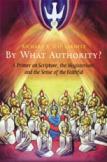The Essence of Belief
The principal question this book addresses is hardly ever voiced in these words: What do I have to believe in order to be Catholic? Rather, Catholics from all walks of life wonder about, and struggle with, the normativity of ecclesial doctrine by asking themselves and each other such questions as “Does it matter what the bishops say about the relative justice of an impending war?” “Should we as Catholic parents obey or disregard the church’s teachings regarding the various means of birth control?” “Can I be confirmed even if I disagree with the church’s exclusion of women from orders?”
Vital questions like these can deal with the most intimate and difficult of matters: end-of-life medical decisions, the sexual orientation of a son or daughter, the very structure of our economic and political systems. Such questions cause much anxiety among faithful Catholics, who, within the complexity of the many emotional and moral claims upon their hearts and minds, seek to form and inform their consciences in order to live out the consequences of their Christian faith in daily life. “By what authority?” one asks, when one reads a new papal encyclical or hears a Sunday homily by a visiting priest or reads a work of speculative theology by a well-respected scholar.
The God of Jesus Christ is the one and only source of all authority, both in the church and in every other aspect of reality, social as well as natural. Richard Gaillardetz begins, therefore, by leading the reader through a quite accessible theology of revelation. The God who creates and holds all things in being, as an expression of divine love, is self-revelatory by nature. Human persons, the recipients of revelation, have by nature a finite ability to understand, know and love God in return. Thus, all authoritative human formulations and expressions of divine revelation (including all religious texts, sacraments and symbols) are finite expressions of the infinite God’s self-gift, and these expressions function well when they point to the always greater truth of the mystery of God, a salvific mystery revealed as such in the Christ event.
With this invitation to humble faith as a starting point, Gaillardetz (the Murray/ Bacik Professor of Catholic Studies at the University of Toledo in Ohio) then guides the reader on a threefold exploration of the media of divine authority: Scripture and tradition, church teaching and the church’s teaching office, and the consensus of the faithful members of the believing community. Each of these three sections is divided into three chapters (there is a delightfully solid trinitarian character both to the organization of Gaillardetz’s book and to the theology that undergirds it). Each chapter presents a clear exposition of the theological claims the church makes about revelation in these different media. Each chapter concludes with a couple of “disputed questions” that move beyond the established teaching of the church into areas of debate and uncertainty in the faith lives of contemporary American Roman Catholics. Here, for example, feminist concerns are aired, the power of the Roman Curia is queried and the meaning of the term “faithful Catholic” is explored. Finally, the author has appended to each chapter a list of books and articles for further reading, should one be inclined to a fuller and more complex treatment.
Labeled a primer, By What Authority? serves as a general introduction to basic Catholic theological notions and practices that arise from and respond to authoritative texts, offices and traditions. It also helps believers understand the very nature of their belief, and thus the nature of the local church as a community of believers, and of the universal church as a communion of communions. The book would serve well as a text for college undergraduates in an introductory course or for adults in a parish enrichment course. Especially helpful to such audiences would be the sections on the various levels of normativity of papal and episcopal (collegial) pronouncements.
To say, as the author does at the beginning, that the book is “written in the spirit of Vatican II” does not yet capture the flavor of the text. Of course, there is a wide range of interpretation of the documents of the council, from revolutionary to restorationist. Gaillardetz’s book is written as an honest and charitable presentation of the current teaching of the hierarchical magisterium, with a respectful treatment of the authority of sovereign conscience for each and all believers. Thus, the book captures not only the intellectual content of the council but its hopefulness as well.
In the end, the authority of God is rooted in the authorship of God, who writes our lives and our history in mysterious ways; yet we can read only “fits and snatches, through creation, the face of the stranger, and the mediations of sacred texts and offices.” The members of the church and the church as a whole are both the recipient and the instrument of this divine composition, this divine self-revelation. For this reason, we recognize these human instruments of divine authority as both precious and necessary.
This book will whet your appetite to re-read these sacred texts with renewed interest.
This article also appeared in print, under the headline “The Essence of Belief,” in the February 2, 2004, issue.








